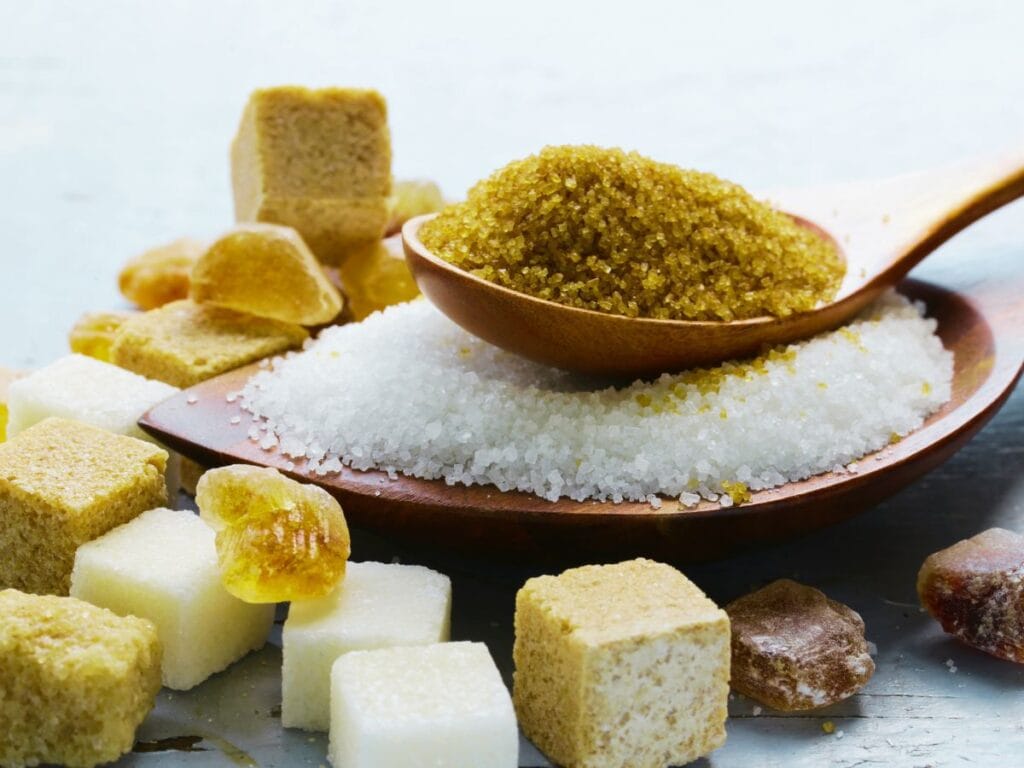Sweeteners can be a sticky subject—pun fully intended. But if you’re searching for healthy vegan sweeteners that won’t spike your blood sugar or your skepticism, you’ve landed in exactly the right place.
Let’s face it: the sugar substitute aisle is a confusing maze of bold claims and fine print. Many so-called “natural” options don’t live up to their promises. That’s why I put together this guide—to cut through the noise and spotlight 13 healthy vegan sweeteners that are actually worth your time.
In this article, we’ll take a close look at each option’s glycemic index (GI), nutritional value, affordability, and any unique perks. And when possible, I’ll recommend trusted vegan-friendly brands to make your sweet choices even simpler.
What Makes Vegan Sweeteners Truly Healthy?

Before diving into our list, let’s first clarify what “healthy” actually means for sweeteners. After all, not every sweet-tasting product deserves space in your pantry. So then, what exactly sets the good ones apart?
To qualify as a healthy sweetener, the ideal option should meet all these important criteria:
First and foremost, it needs a low glycemic index. As a result, this prevents those nasty spikes and crashes in your blood sugar levels—something we all desperately want to avoid.
Secondly, it should be minimally processed. In other words, it should remain close to its natural form. Therefore, no artificial chemicals or synthetic additives, please!
Furthermore, a truly healthy sweetener offers actual nutritional benefits. Think vitamins, minerals, or antioxidants—rather than just empty calories.
Last but definitely not least, it must be 100% free of animal-derived ingredients. Because obviously, we’re all about that compassionate, cruelty-free, plant-based life.
13 Healthy Vegan Sweeteners That Transform Your Kitchen
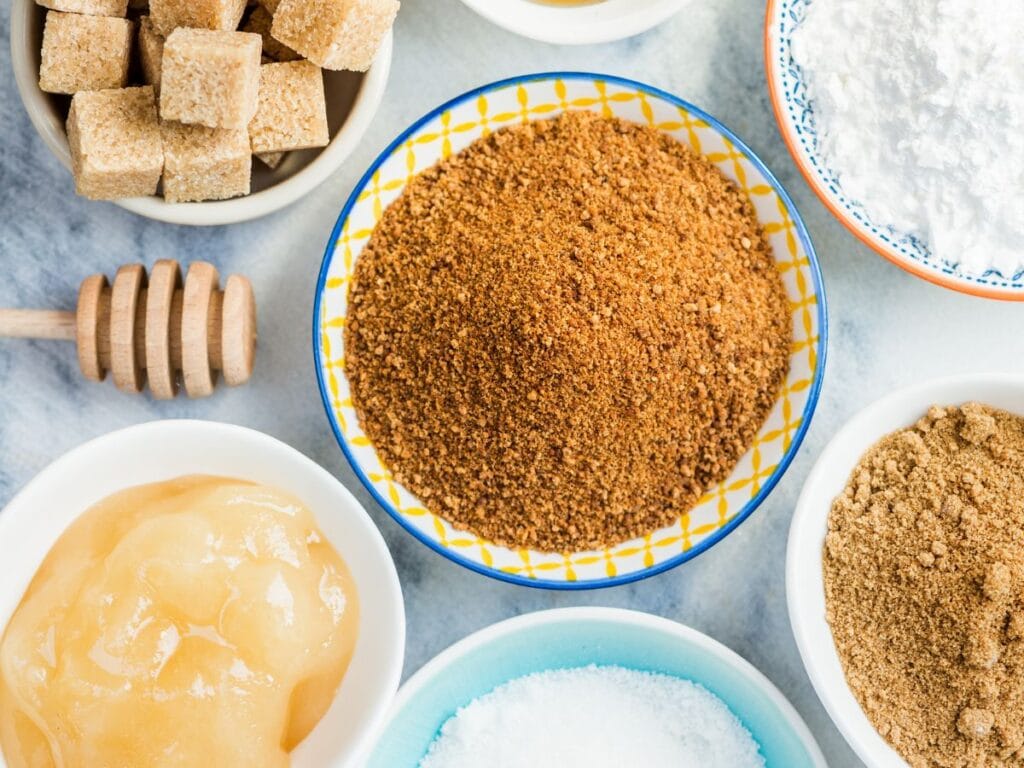
Discovering the perfect vegan sweetener is like finding that extra dash of magic in your favorite treat. Whether you’re baking up a storm, stirring sweetness into your morning brew, or simply exploring new flavors, there’s a whole world of plant-based options to explore. Each vegan sweetener brings its own character, and the joy is in finding the ones that fit your lifestyle and taste buds just right.
1. Monk Fruit Extract – The Zen Master: Monk Fruit’s Ancient Sweet Wisdom
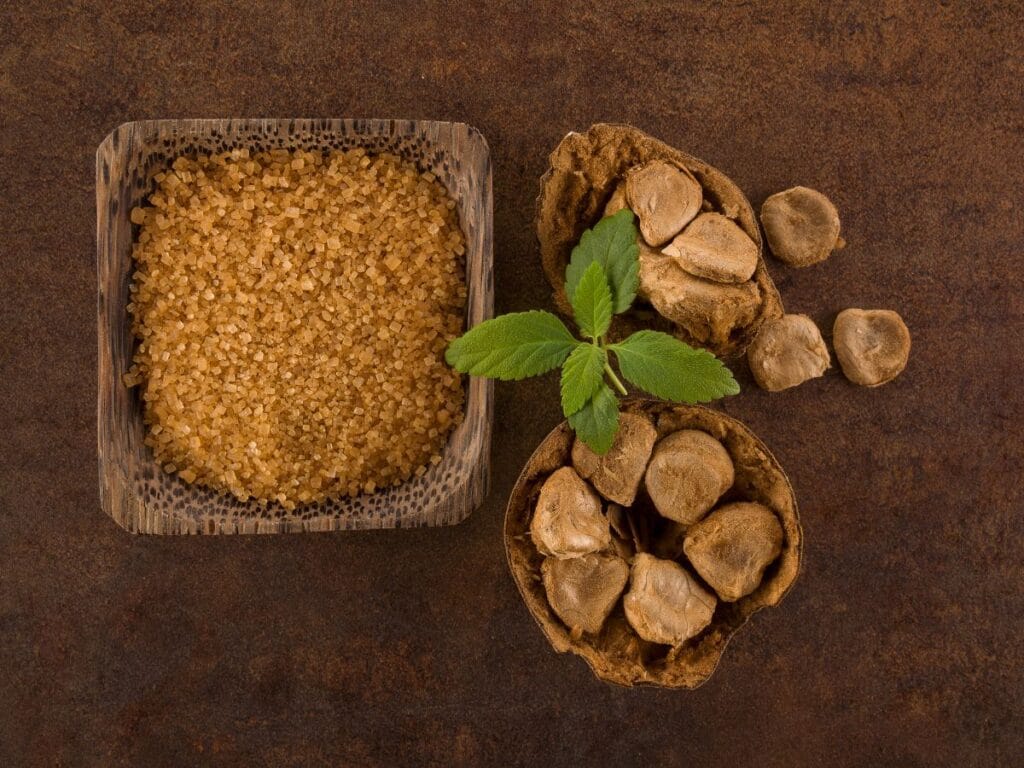
Glycemic Index: 0
Monk fruit sweetener is quickly becoming a superstar in natural sweeteners—for good reason. This small, round fruit originally comes from Southeast Asia. For centuries, it’s been treasured in Traditional Chinese Medicine. Only recently, however, has it made its way to Western markets, where it’s gaining well-deserved popularity.
So what makes monk fruit so special? Unlike other sweeteners, its sweetness doesn’t come from fructose or glucose. Instead, it comes from powerful antioxidants called mogrosides. Amazingly, these natural compounds are about 150-200 times sweeter than regular sugar. Even more impressive? They don’t raise blood sugar levels—at all.
In essence, monk fruit delivers intense sweetness without the crash. As a result, it’s perfect for anyone watching their glycemic impact.
Health Benefits:
- Zero calories and zero carbs
- Contains powerful antioxidants that may combat free radicals
- Studies suggest potential anti-inflammatory properties
- Won’t contribute to tooth decay like sugar
Best Uses: Great in beverages, smoothies, desserts, and baking where you need concentrated sweetness. However, it works best combined with other ingredients. Some people notice a slight aftertaste when used alone.
Cost Factor: ★★★★☆ (More expensive than most sweeteners, but a little goes a very long way)
2. Stevia – The Green Goddess: Stevia’s Zero-Guilt Sweet Magic
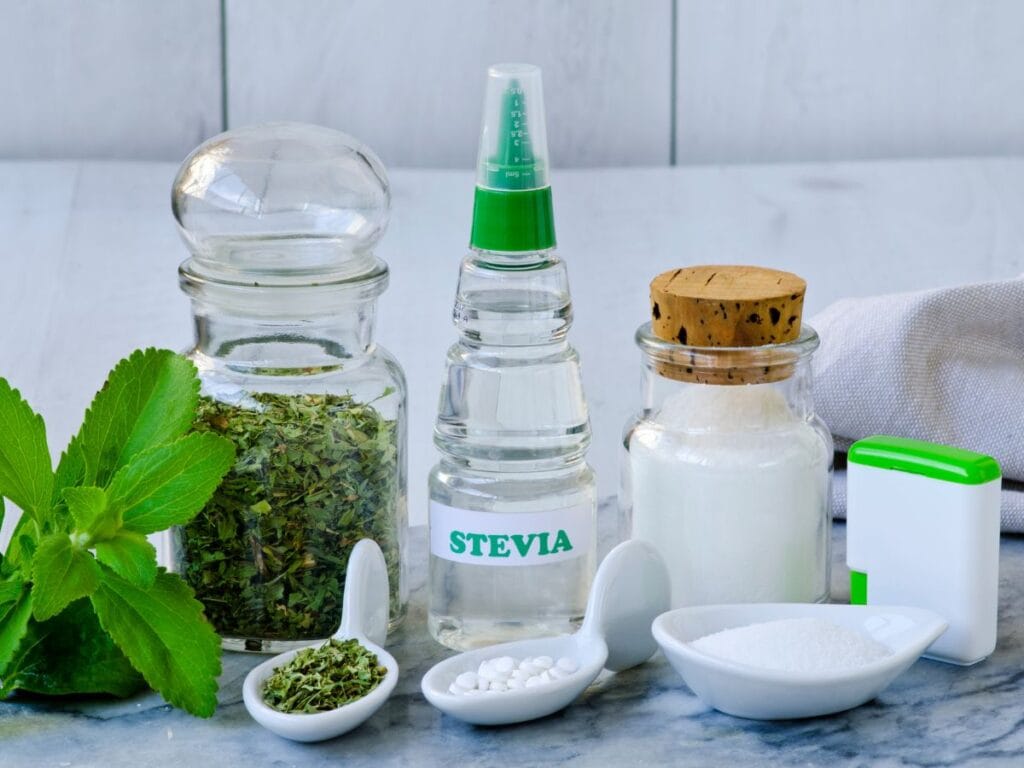
Glycemic Index: 0
Another excellent zero-calorie, zero-glycemic option is stevia. It comes from the leaves of the Stevia rebaudiana plant. Most people know stevia as a white powder or liquid extract on store shelves. Yet surprisingly, few realize that in its natural leaf form, it contains beneficial plant compounds. Unfortunately, commercial processing often removes these compounds. Consequently, the final product may differ greatly from the original leaf in both nutrition and complexity.
Health Benefits:
- May help lower blood pressure in those with hypertension
- Some studies suggest it could improve insulin sensitivity
- Contains antioxidant compounds in less processed forms
- Zero calories and doesn’t promote tooth decay
Best Uses: Works well in cold beverages, yogurts, smoothies, and recipes that don’t need sugar’s bulking properties. For maximum health benefits, look for “green leaf stevia” or “whole leaf stevia” rather than highly refined white stevia powder.
Cost Factor: ★★★☆☆ (Moderate price, though the higher-quality whole leaf versions cost more)
3. Date Syrup – Liquid Gold: Date Syrup’s Nutrient-Packed Sweet Kiss
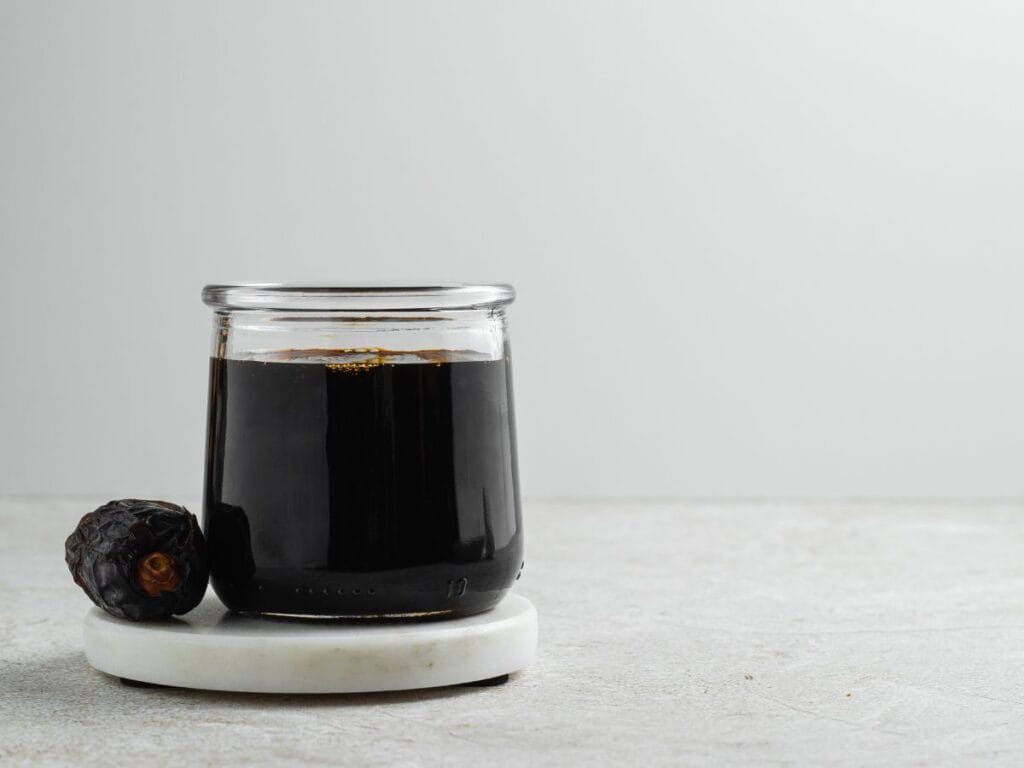
Glycemic Index: 47-55
Perhaps the most nutritionally rich option on our list, date syrup is simply whole dates concentrated into a thick, caramel-like syrup. Unlike most sweeteners that offer nothing but sweetness, date syrup keeps many nutrients found in whole dates.
Health Benefits:
- Rich in potassium, magnesium, copper, and B vitamins
- Contains significant antioxidants—more than maple syrup or honey
- Provides fiber, slowing sugar absorption
- A 2015 study found it has antibacterial properties that may be superior to honey
Best Uses: Try drizzling it on oatmeal, pancakes, or yogurt. It’s also amazing in energy balls or bars. I personally love using it in salad dressings or marinades too.
Cost Factor: ★★★☆☆ (Mid-range price, though you can make your own economically by blending soaked dates with water)
[Image suggestion: A close-up of dark, glossy date syrup being drizzled from a spoon onto a vibrant vegan breakfast bowl]
4. Yacón Syrup – The Gut Whisperer: Yacón’s Prebiotic Sweet Secret
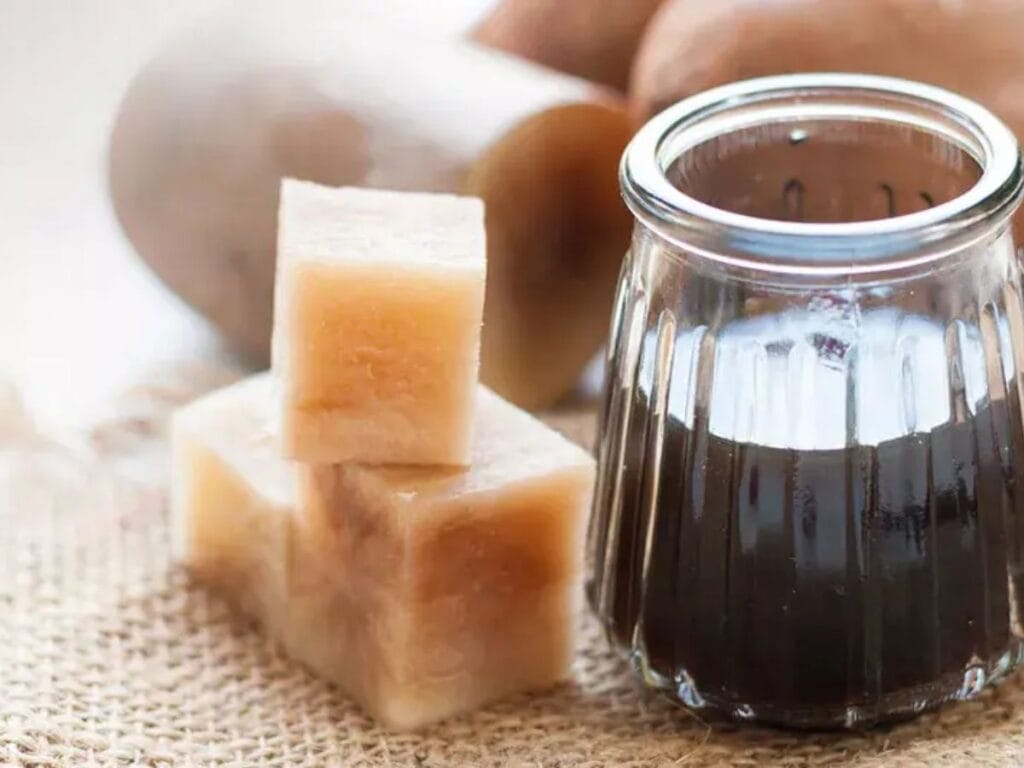
Glycemic Index: 1
This lesser-known syrup comes from the yacon root. People in the Andean highlands have consumed it for centuries. Only recently, meanwhile, has it gained attention in health food circles. What makes yacón syrup special is its high concentration of fructooligosaccharides (FOS). These are indigestible sugars that act as prebiotics, feeding your beneficial gut bacteria.
Health Benefits:
- Contains 40-50% FOS, which functions as soluble fiber
- Supports digestive health by nourishing probiotic bacteria
- May help with constipation and improve mineral absorption
- Some studies suggest it may aid weight loss and improve insulin sensitivity
Best Uses: It’s perfect for drizzling on foods, mixing into beverages, or using in raw desserts. Just note that it loses some beneficial properties when heated above 248°F (120°C).
Cost Factor: ★★★★☆ (One of the pricier options, but the health benefits justify the cost)
5. Pure Maple Syrup – Tree Candy: Maple’s Pure Sweet Perfection
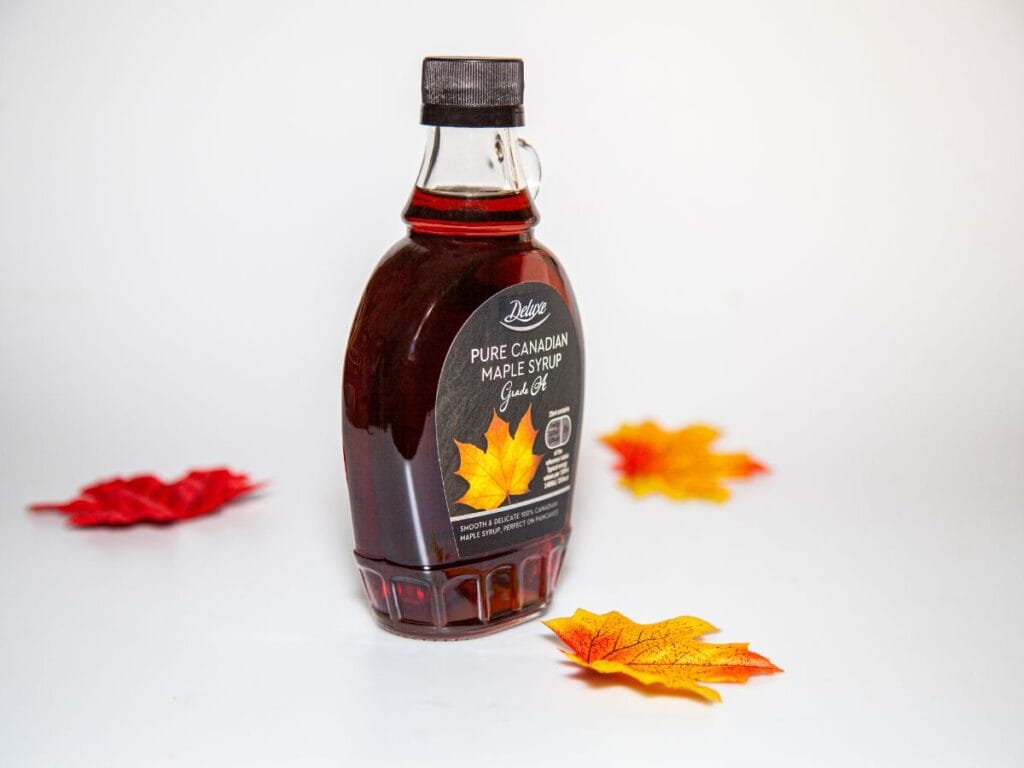
Glycemic Index: 54
Don’t confuse this with “maple-flavored” pancake syrups! Those are often just corn syrup with artificial flavoring. Real maple syrup comes from maple trees and undergoes minimal processing. It contains over 24 different antioxidants and beneficial minerals.
Health Benefits:
- Contains manganese, zinc, potassium, calcium, and iron
- Provides compounds with anti-inflammatory properties
- Has a lower glycemic index than regular sugar
- Contains phenolic compounds that may help protect against cancer
Best Uses: Perfect for baking, glazes, sauces, dressings, and of course, drizzling on breakfast foods.
Cost Factor: ★★★☆☆ (Mid-range price, with significant quality variations)
6. Blackstrap Molasses – The Iron Giant: Molasses’ Mineral-Rich Sweet Power
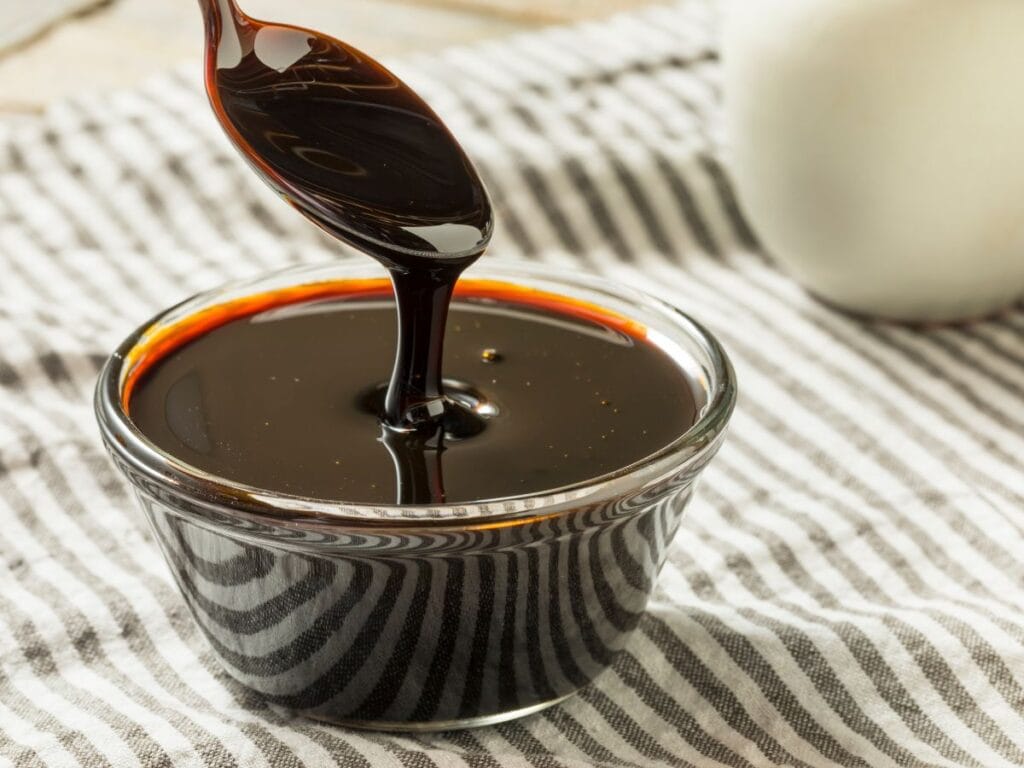
Glycemic Index: 55
This is the nutritional powerhouse of sweeteners. Blackstrap molasses is what remains after sugar cane juice has been boiled three times to extract maximum sugar. While regular molasses is more refined, blackstrap retains significant minerals.
Health Benefits:
- Exceptionally high in iron (1 tablespoon provides about 20% of daily needs)
- Rich source of calcium, magnesium, potassium, and B vitamins
- Contains antioxidants that may help reduce cellular damage
- May help stabilize blood sugar levels despite its sweetness
Best Uses: Fantastic in gingerbread, baked beans, BBQ sauces, and other recipes where its robust flavor works well. I often add a small amount to my morning smoothies for an iron boost.
Cost Factor: ★★☆☆☆ (One of the most affordable nutritious sweeteners)
7. Coconut Sugar – Tropical Treasure: Coconut’s Caramel-Kissed Crystals
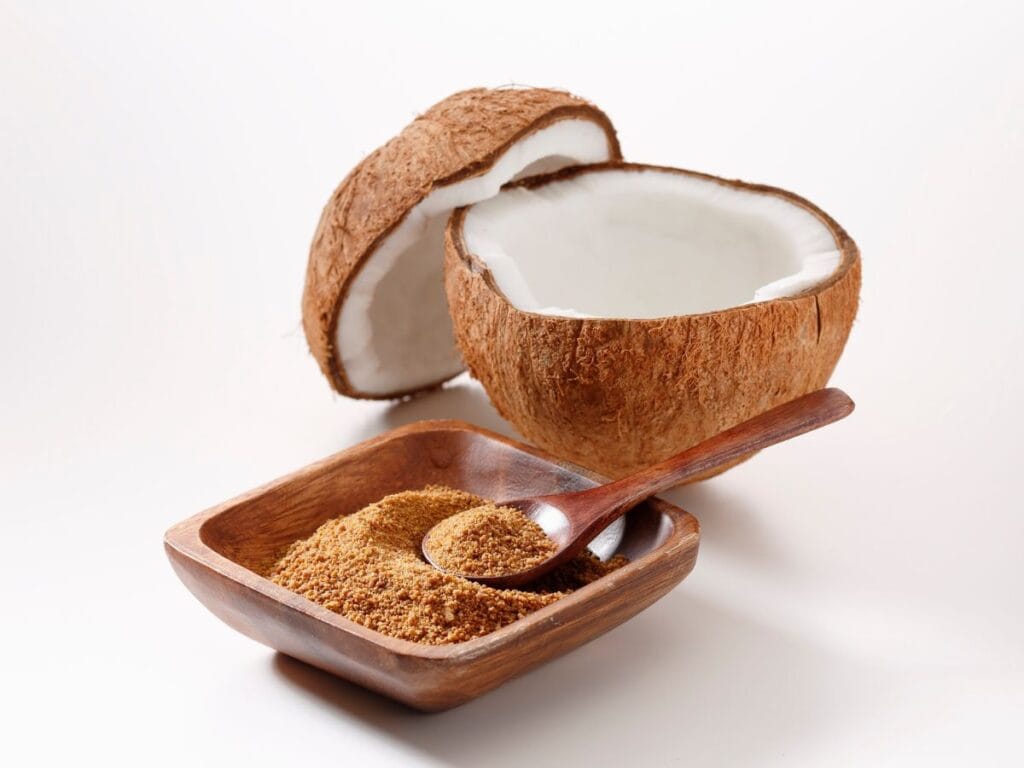
Glycemic Index: 35-54
Made from the sap of coconut palm blossoms, coconut sugar has a caramel-like flavor similar to brown sugar but with considerably more nutrients. It’s often marketed as more sustainable than cane sugar, though this depends greatly on production practices.
Health Benefits:
- Contains small amounts of minerals including iron, zinc, potassium, and calcium
- Includes inulin, a fiber that may slow glucose absorption
- Lower glycemic index than regular sugar
- Minimal processing compared to refined sugars
Best Uses: You can substitute it 1:1 for brown sugar in most recipes. This makes it one of the easiest healthy sweeteners to use in baking.
Cost Factor: ★★★☆☆ (Moderately priced and becoming more affordable as popularity increases)
Quick Reference Guide: Healthy Vegan Sweeteners Compared
| Sweetener | Glycemic Index | Calories (per tbsp) | Key Nutrients | Best For | Cost |
| Monk Fruit Extract | 0 | 0 | Antioxidants (mogrosides) | Sugar-free baking, beverages | ★★★★☆ |
| Stevia | 0 | 0 | Antioxidants (in whole leaf form) | Beverages, no-bake recipes | ★★★☆☆ |
| Date Syrup | 47-55 | 60 | Potassium, magnesium, B vitamins, fiber | Drizzling, energy bars, marinades | ★★★☆☆ |
| Yacon Syrup | 1 | 20 | Prebiotics (FOS), potassium | Raw desserts, drizzling | ★★★★☆ |
| Pure Maple Syrup | 54 | 52 | Zinc, manganese, antioxidants | Baking, breakfast foods, glazes | ★★★☆☆ |
| Blackstrap Molasses | 55 | 47 | Iron, calcium, magnesium, potassium | Gingerbread, sauces, iron supplementation | ★★☆☆☆ |
| Coconut Sugar | 35-54 | 45 | Small amounts of minerals, inulin fiber | Direct sugar replacement in baking | ★★★☆☆ |
| Lucuma Powder | 25 | 30 | Beta-carotene, niacin, iron | Smoothies, raw desserts | ★★★★☆ |
| Brown Rice Syrup | 25 | 55 | Trace minerals | Binding ingredients, crispier baked goods | ★★☆☆☆ |
| Fruit Purees | 30-50 (varies) | 30-50 (varies) | Fiber, vitamins C and A | Baking, smoothies, sauces | ★☆☆☆☆ |
| Jerusalem Artichoke Syrup | 10-15 | 40 | Inulin (prebiotic fiber), iron | Tea sweetener, drizzling | ★★★★★ |
| Mesquite Powder | 25 | 16 | Protein, calcium, iron, lysine | Smoothies, raw desserts, spice substitute | ★★★★☆ |
| Barley Malt Syrup | 42 | 60 | Small amounts of B vitamins | Bread making, brewing, cereals | ★★☆☆☆ |
8. Lucuma Powder – The Incan Dream: Lucuma’s Superfood Sweet Embrace
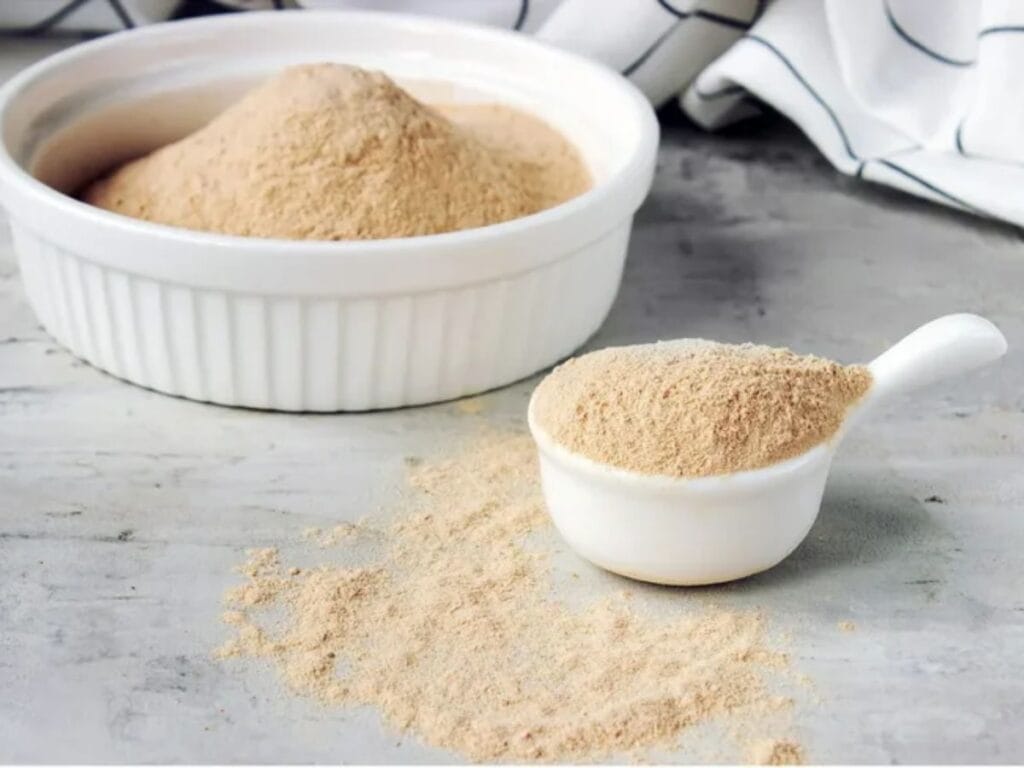
Glycemic Index: 25
This Peruvian superfood sweetener comes from the dried flesh of the lucuma fruit. With a naturally sweet maple-like flavor, it’s become popular in the raw food community as a nutritious sweetener that doesn’t spike blood sugar.
Health Benefits:
- Contains beta-carotene, iron, zinc, vitamin B3, calcium, and protein
- Low glycemic impact makes it suitable for those watching blood sugar
- Rich in antioxidants that may help reduce oxidative stress
- Provides a subtle sweetness without the negative effects of refined sugar
Best Uses: Works wonderfully in smoothies, raw desserts, homemade ice cream, and baked goods. You can also use it as a partial flour substitute in recipes.
Cost Factor: ★★★★☆ (On the pricier side but considered a “superfood” for its nutritional density)
9. Brown Rice Syrup – The Gentle Giant: Rice Syrup’s Slow-Burn Sweetness
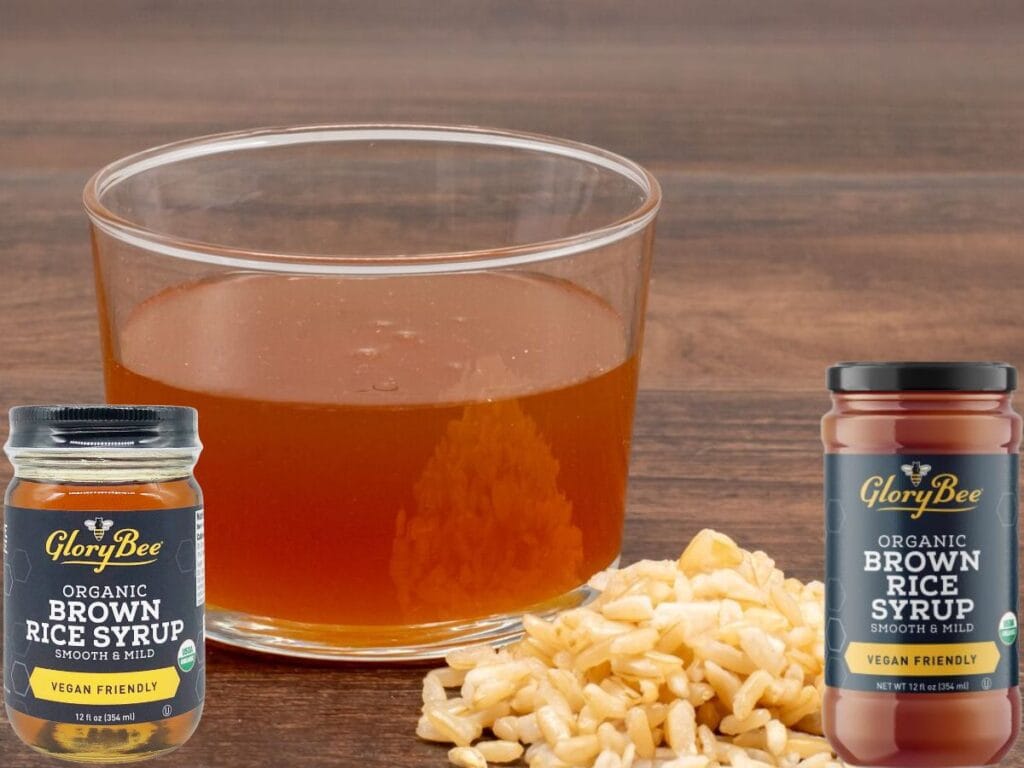
Glycemic Index: 25
Created by exposing cooked rice to enzymes that break down starches, this syrup has a mild, buttery flavor. While not as nutrient-dense as some others on our list, its relatively low glycemic impact makes it worth considering.
Health Benefits:
- Contains small amounts of minerals from rice
- Composed of complex carbohydrates that break down more slowly than simple sugars
- Vegan alternative to honey in recipes
- Helps bind ingredients in homemade energy bars
Best Uses: Great for granola bars, rice crispy treats, and recipes that benefit from its binding properties. It creates crispier cookies and brownies than sugar does.
Cost Factor: ★★☆☆☆ (Reasonably priced and widely available in health food stores)
10. Fruit Purees – Nature’s Candy: Whole Fruit’s Fiber-Full Sweet Hug
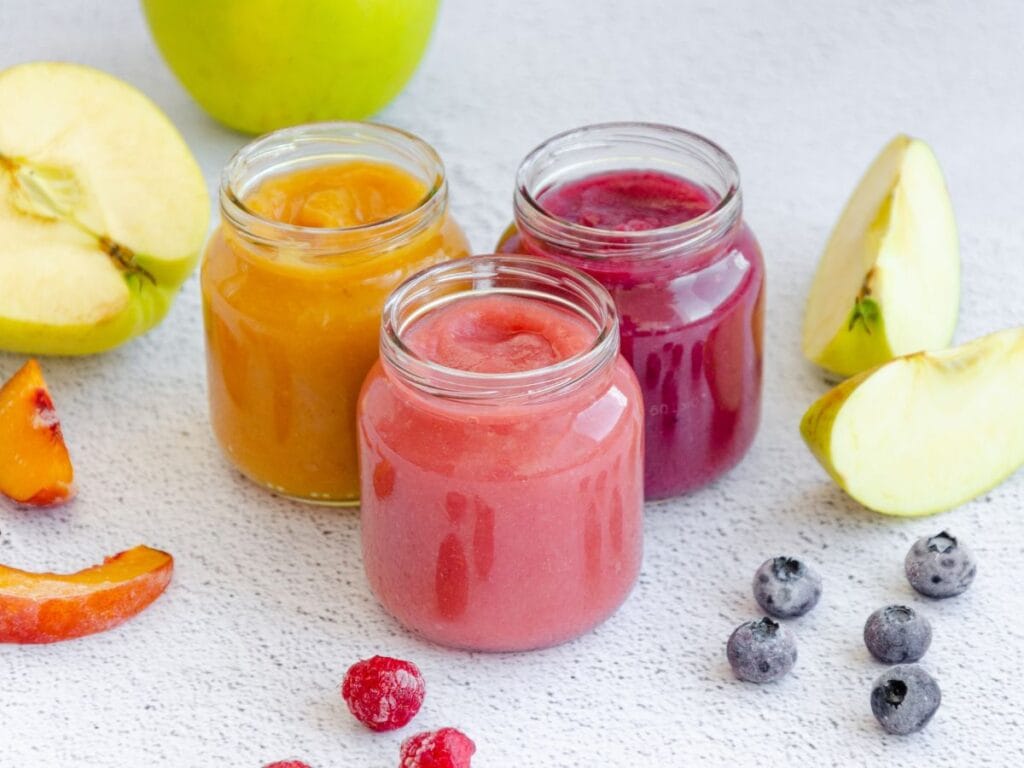
Glycemic Index: Varies (30-50 for most)
Whole fruit purees—particularly from apples, bananas, and dates—are among the most natural sweeteners available. They provide sweetness along with fiber, vitamins, and minerals.
Health Benefits:
- Contains the fiber, vitamins, and antioxidants of whole fruits
- Fiber helps slow sugar absorption
- No empty calories—nutrients come with the sweetness
- Can replace oil in some baking recipes, offering multiple benefits
Best Uses: Perfect for baking muffins, breads, and cakes. Also great for creating sauces, sweetening oatmeal, or making homemade energy bars.
Cost Factor: ★☆☆☆☆ (Most economical option, especially if making your own)
11. Jerusalem Artichoke Syrup – The Rare Gem: Jerusalem Artichoke’s Prebiotic Sweet Mystery
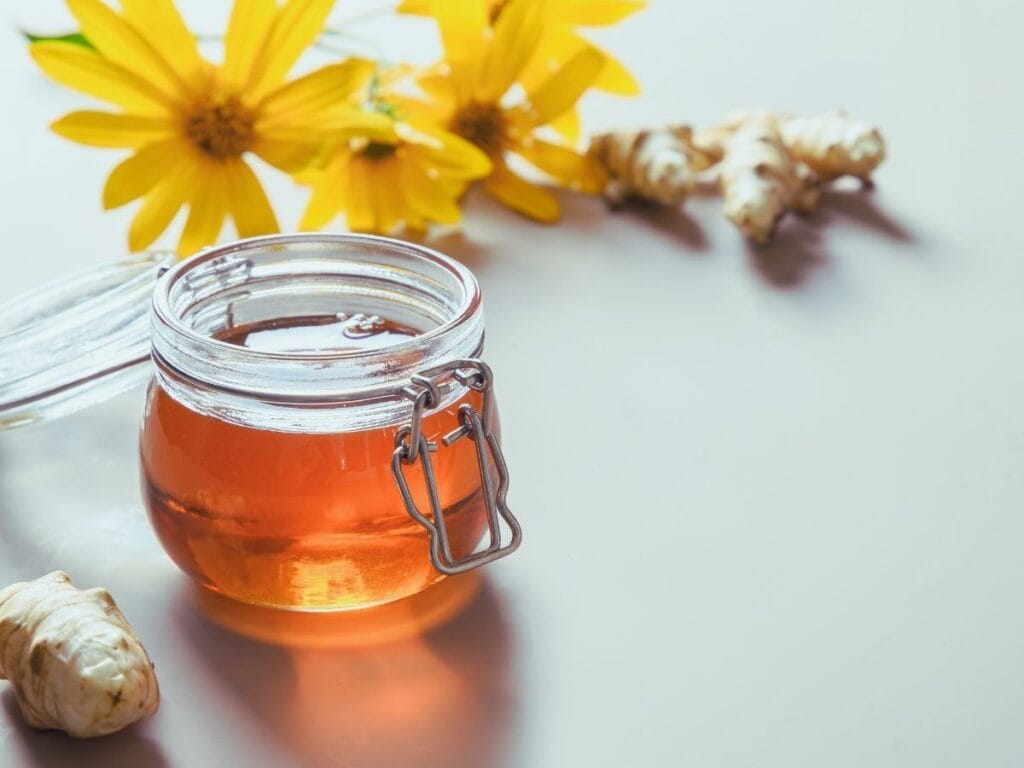
Glycemic Index: 10-15
This rare gem in the sweetener world comes from the Jerusalem artichoke (actually a sunflower tuber, not an artichoke). Its primary sugar is inulin, which functions as a prebiotic fiber rather than being absorbed as sugar.
Health Benefits:
- Extremely high in inulin, which feeds beneficial gut bacteria
- One of the lowest glycemic sweeteners available
- May help improve calcium absorption
- Contains iron and potassium
Best Uses: Works well as a tea sweetener, drizzled on pancakes, or used in raw food recipes. Start with small amounts. Too much inulin can cause digestive discomfort for some people.
Cost Factor: ★★★★★ (The most expensive option on the list, but unique in its properties)
12. Mesquite Powder – Desert Magic: Mesquite’s Protein-Packed Sweet Surprise
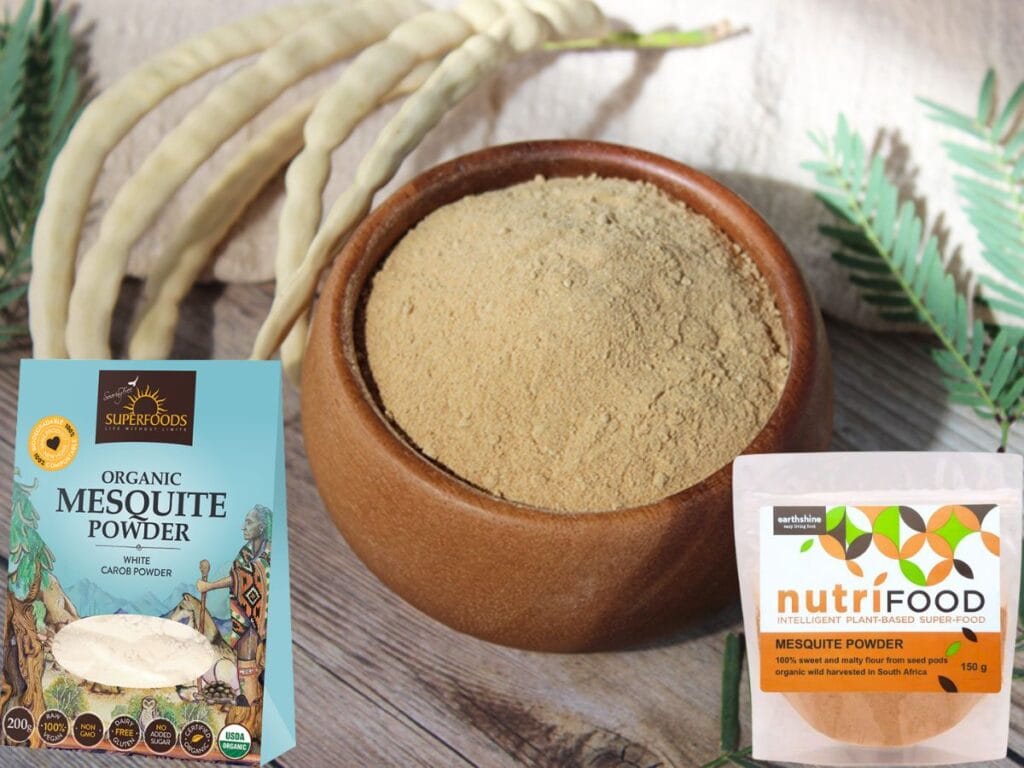
Glycemic Index: 25
Ground from the pods of the mesquite tree, this sweetener has a unique caramel and chocolate-like flavor with hints of cinnamon. Popular in raw food circles, it’s both nutritious and low glycemic.
Health Benefits:
- Contains protein (16%), which is rare for a sweetener
- High in dietary fiber (25%)
- Good source of calcium, iron, lysine, and potassium
- Stabilizes blood sugar due to fiber content
Best Uses: Try sprinkling it into smoothies, chia puddings, or raw desserts. It also works as a partial flour substitute in baking. I love combining it with cacao for a chocolate-caramel flavor profile.
Cost Factor: ★★★★☆ (Expensive but concentrated, so a little goes a long way)
13. Barley Malt Syrup – The Baker’s Best Friend: Barley Malt’s Complex Sweet Soul
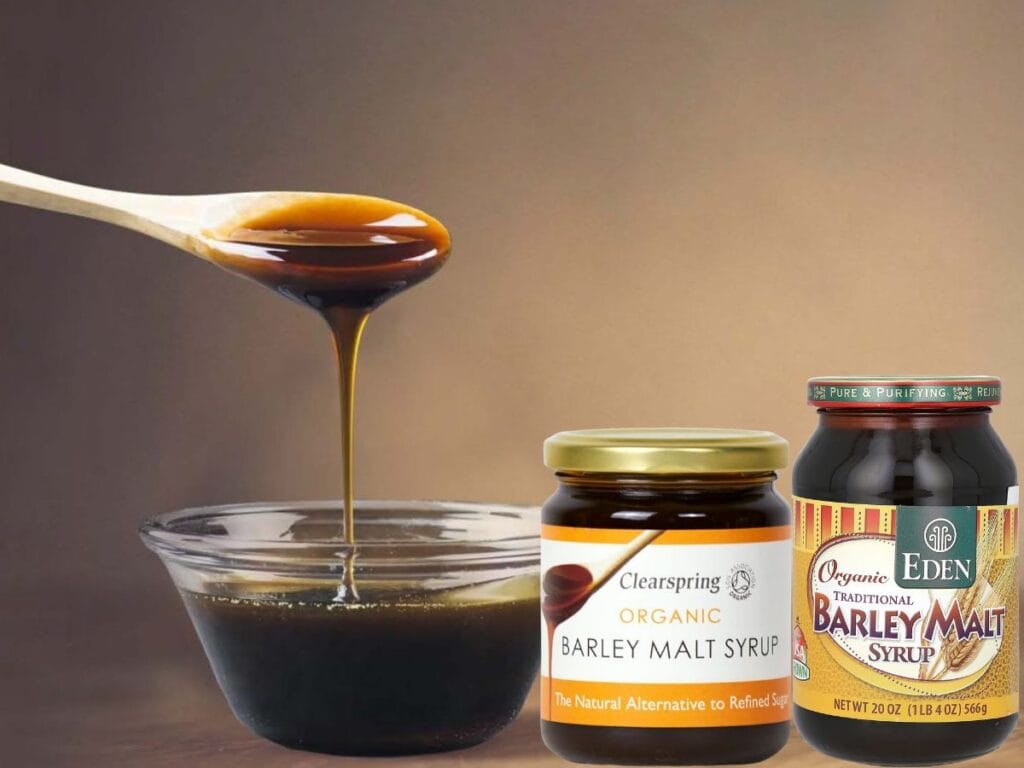
Glycemic Index: 42
Made from sprouted barley, this thick, dark syrup contains complex carbohydrates that metabolize more slowly than simple sugars. Its rich malt flavor works particularly well in certain recipes.
Health Benefits:
- Contains small amounts of B vitamins and minerals
- Lower glycemic impact than regular sugar
- Half as sweet as sugar, encouraging more moderate sweetener use
- Maltose breaks down more slowly than sucrose or fructose
Best Uses: Excellent in homemade breads, cereals, and malted desserts. It’s essential for authentic bagels and pretzels. Just note: It contains gluten, so it’s not suitable for those with celiac disease or gluten sensitivity.
Cost Factor: ★★☆☆☆ (Reasonably priced for its specialty uses)
Why These Sweeteners Don’t Make the Healthy Vegan Cut

Not all sugar alternatives are created equal. Here are a few that might seem healthy but come with drawbacks:
- Artificial Sweeteners (Aspartame, Sucralose, Saccharin): These are highly processed and linked to digestive issues. Many people also report headaches after consumption.
- High-Fructose Corn Syrup: This sweetener contributes to insulin resistance and metabolic disorders. It’s also typically made from GMO corn.
- White Sugar (Even if Organic!): It’s still refined and stripped of nutrients. Plus, some white sugar is processed with bone char, making it non-vegan.
Your Journey with Healthy Vegan Sweeteners Starts Now
Ditching refined sugar doesn’t mean sacrificing flavor—or compromising your vegan values. In fact, with these alternatives, you can easily satisfy your sweet tooth while staying true to your plant-based lifestyle.
Maybe you’ll start sipping on a stevia-sweetened latte tomorrow morning. Or perhaps you’ll bake cookies using nutrient-rich blackstrap molasses this weekend. These 13 sweeteners prove that you really can have your cake and eat it too—vegan, of course.
Ready to get started? First, try making just one small swap in your next recipe. Even a simple change can be a delicious step toward more sustainable, wholesome living. Eventually, you might be surprised by how sweet (and satisfying) the transition becomes.

